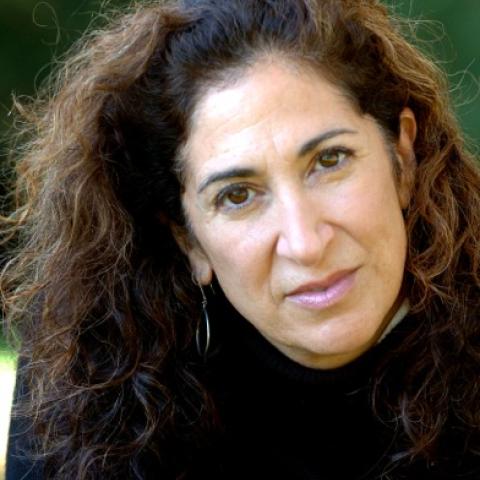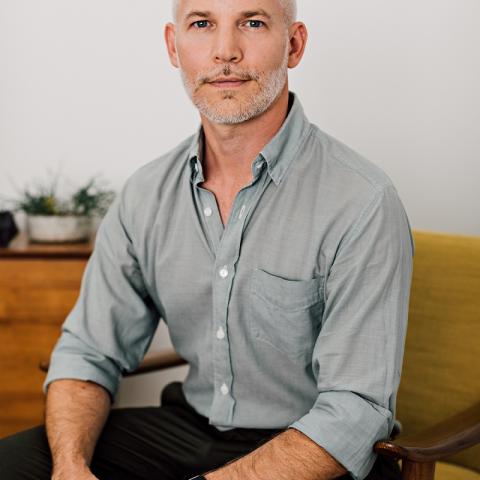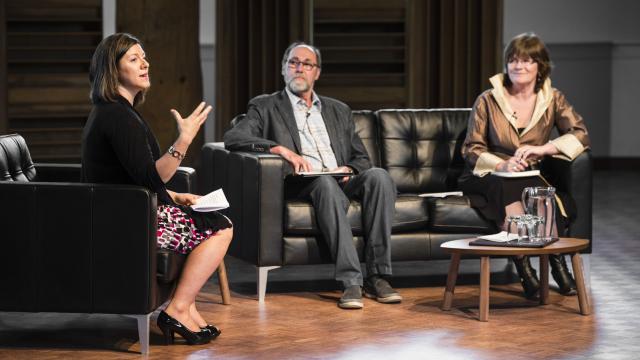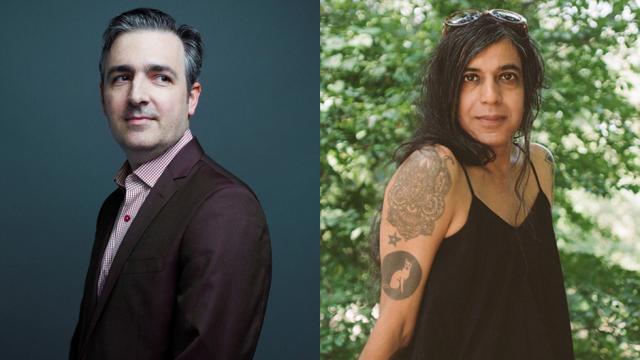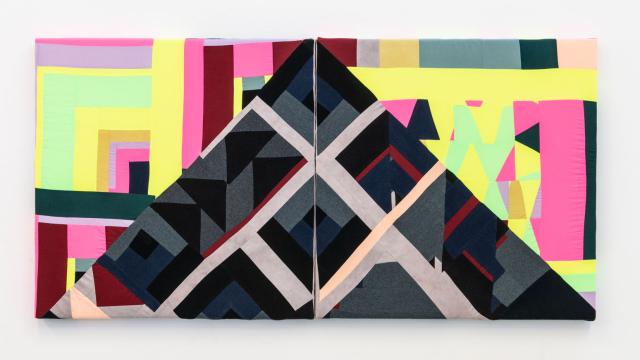Want to find out more about upcoming programs? Please subscribe to our mailing list.
Program Information
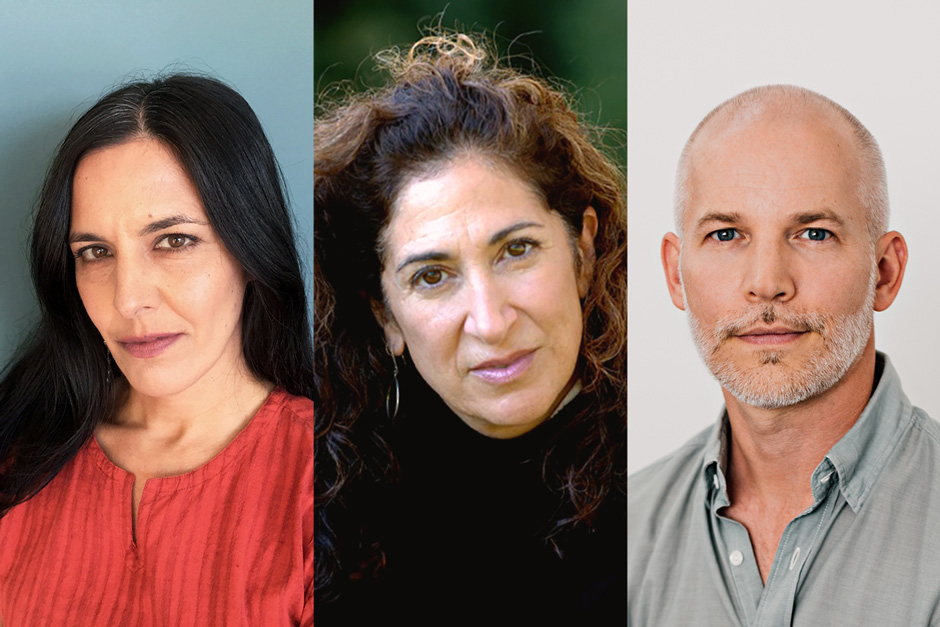
Program faculty, Charlotte Gill, Carol Shaben and Michael Harris
Overview
This two-week residency encourages the exploration of new ideas in journalism and experimentation in writing. Designed to challenge and stimulate, the program aims to inspire creative pieces of nonfiction and to assist the writers in their completion.
A preeminent space for long-form journalism, this residency emphasizes the strengths of thorough and articulate reporting, distinctive storytelling, and literary devices. Work created in this program has been published in many outlets including The Globe and Mail, The Walrus, and The Atlantic, and pieces have gone on to win National Magazine and National Newspaper Awards.
What does the program offer?
Faculty provide mentorship and one-on-one workshopping. Instructors will discuss story ideas, craft concepts such as voice and structure, and challenges writers may be encountering with their literary journalism. Writers will have time to work on their manuscripts, receive individual consultations with faculty, and participate in group discussions.
Successful applicants will receive 100% scholarship to cover tuition, on-site accommodation, and on-site meals.
Who should apply?
Literary Journalism is designed for writers seeking a professional development opportunity in a community of peers with the guidance of an experienced writer/editor, as each participant prepares a long form piece (3,000 – 5,000 words).
Applicants should be experienced professionals, active in the diversified fields of writing, including print or electronic media. This program is open to fiction and non-fiction writers, journalists, freelance critics or curators, artists, and academics, with an emphasis on those who can write for a lay audience with logic, vigour, and charm—and those who have a portfolio to prove it.
We welcome writers from all backgrounds, and all gender identities and expressions.
Please note: This program is run in English and participants are accepted for an English-language essay.
The Literary Journalism program is generously supported by:
Rogers Communications Chair in Literary Journalism Endowment Fund
Faculty
What's Included
Your program fee includes a single bedroom on the Banff Centre campus for the duration of your program.
Get connected with other artists on campus and focus on your projects in a creative environment while we take care of the day-to-day essentials.
Using a credit-based system to dine on campus, our flexible meal plans allow you to select meals according to your own needs during your stay.
The Full Flex meal plan includes $61.95 credit per day, equivalent to breakfast, lunch and dinner at our buffet service.
This program offers opportunities to showcase your work-in-progress in one of our performance venues.
Your program fee includes free access to the climbing gym, and fitness suite as well as discounted rates for classes at the Sally Borden Fitness and Recreation Centre.
Enjoy special artist rates for ticketed performances or complimentary access to events.
Enrich your experience and get to know other artists on campus by taking advantage of the activities and support provided by our Participant Resources team.
Each participant will be allocated a private writing space on campus.
The Paul D. Fleck Library and Archives - Current Services
The Library is delighted to support Banff Centre Participants, Artists, and Faculty with the following services:
- Open hours: 9:30 am to 1 pm, Mondays, Wednesdays, and Fridays.
- Access to collections, including program relevant books, scores, artists’ books, recordings, periodicals, and object library.
- Library accounts for borrowing materials.
- Digital Library, on campus and remote access.
- Library research assistance, by appointment.
- Archives research, by appointment only.
Please email library@banffcentre.ca or archives@banffcentre.ca for more information or assistance.
Fees & Financial Assistance
Application fee: $65 ($35 for applicants who identify as Indigenous)
*Participants accepted to the program will receive 100% scholarship to cover the Program Fee.
*Application fees are not refundable.
Help fund your experience at Banff Centre. View a compiled list of national and international opportunities here.
Banff Centre will issue official tax receipts for eligible tuition fees and financial assistance and awards as required by the Income Tax Act. You will receive a T2202 (Tuition and Enrolment Certificate) for eligible tuition fees paid and a T4A (Statement of Pension, Retirement, Annuity, and Other Income) for applicable financial assistance and awards.
How to Apply
Learn more about the steps to Complete Your Application.
Resume
A 1-3 page resume or C.V. describing academic, professional, and other relevant experience.
Project Summary
Provide a 100-word summary of the proposed project. This summary may be used for administrative and public purposes related to your program.
Publication Names
Applicants should also include the name(s) of the publication(s), national or international, in which the project could or will be published.
Project Proposal
An outline of three to five pages describing the project the applicant proposes to work during the residency, detailing both the reporting that has been done and the textual approach the applicant plans to take. The project is ideally a deeply reported piece of narrative-driven non-fiction of approximately 4,000 words.
General subject matter varies widely from one project to another, and can be concerned with art, science, music, politics, medicine, culture, style, sports, history, personal history, geography, business, or biography, to list a few possibilities.
Work Samples
Up to three samples of relevant recent artistic work not exceeding 25 pages in total.
Financial Assistance
Be sure to complete the Financial Aid question in SlideRoom to be eligible for financial assistance.
NOTE: The time between acceptance to the program and the draft deadline should be used for research and manuscript development in consultation with one of two faculty editors. Once confirmed, accepted applicants will receive details about their assigned editor and submission deadlines prior to the program start date. You are required to arrive with a first draft of your project. Writers should expect to complete and submit a final, publishable draft of between 3,000 and 5,000 words by the end of the residency.
Adjudication
Participants are selected by impartial adjudicators on the basis of their submitted material. The eight successful candidates will be selected from the field of applicants on the basis of writing skill, literary merit, and the relevance and originality of their project idea. Projects can be risk-taking endeavours both stylistically and intellectually. Consideration will also be given to the likelihood that the writer’s work will benefit from the program
Eligibility
Applicants are usually accomplished, professional journalists and writers who have been published in national or international magazines, newspapers, anthologies, or literary journals. However, writers with less experience have also been accepted to the program based on merit, the proposed project and writing skill.
Applicants must be ages 18+ at the time of the program start date.
Note: Past participants of Literary Journalism are not eligible. Those accepted as participants to the program who subsequently find themselves unable to attend for the full program schedule are asked to withdraw and re-apply another year. This program is not open to current faculty members of any other Banff Centre programming.
International Applicants
Banff Centre welcomes domestic and international applicants for this program. Please note, Banff Centre programs do not meet Canadian Student Visa eligibility requirements, you must obtain a Visitor Visa to enter Canada. Accepted individuals are responsible for identifying and complying with the immigration requirements to enter Canada as a visitor from their country of origin. Current wait times to receive a visa are much longer than normal, so applicants who require a Visitor Visa should check the current expected processing times prior to applying.
All programs, faculty, dates, fees, and offers of financial assistance are subject to change. Program fee is subject to applicable taxes. Non-refundable fees and deposits will be retained upon cancellation. Any other fees are refunded at the discretion of the Banff Centre. The application deadline is 11:59 p.m. MDT.
Contact Admissions
For questions on preparing your application, please contact Admissions:
